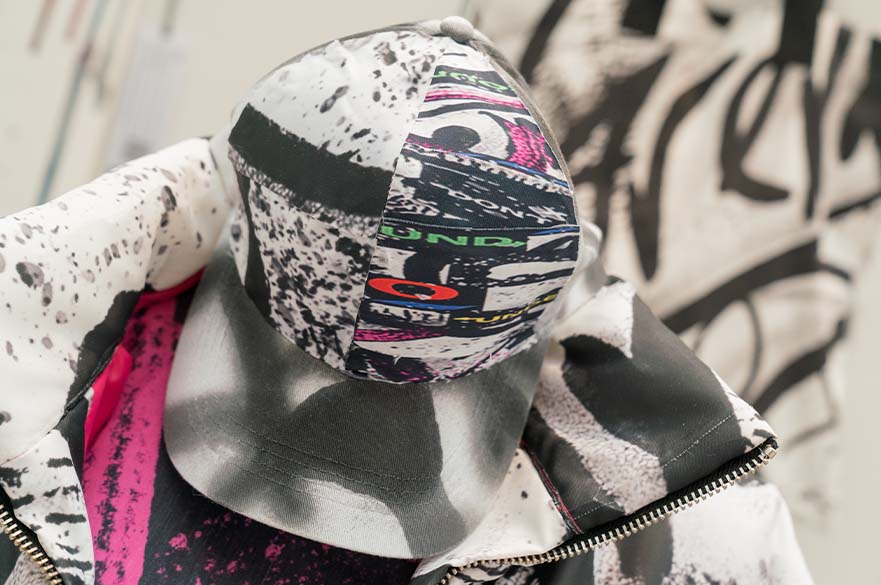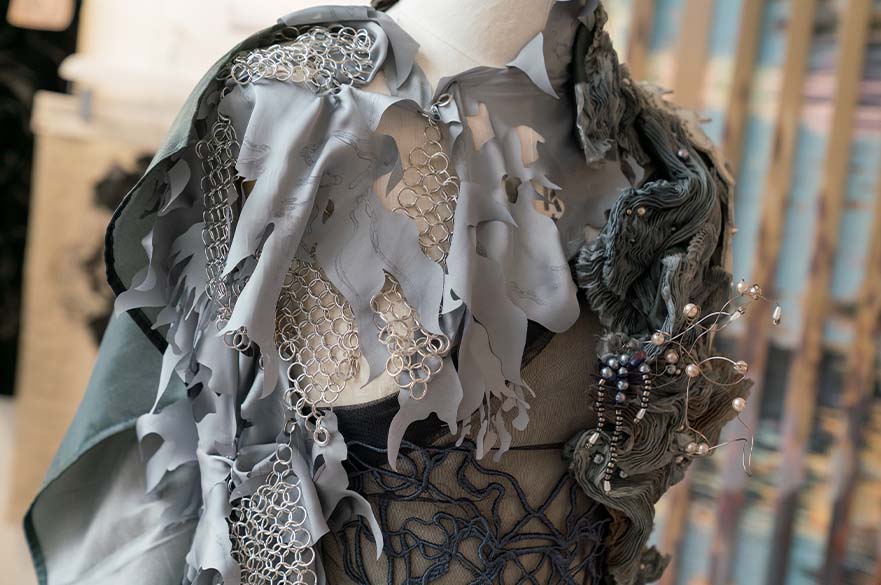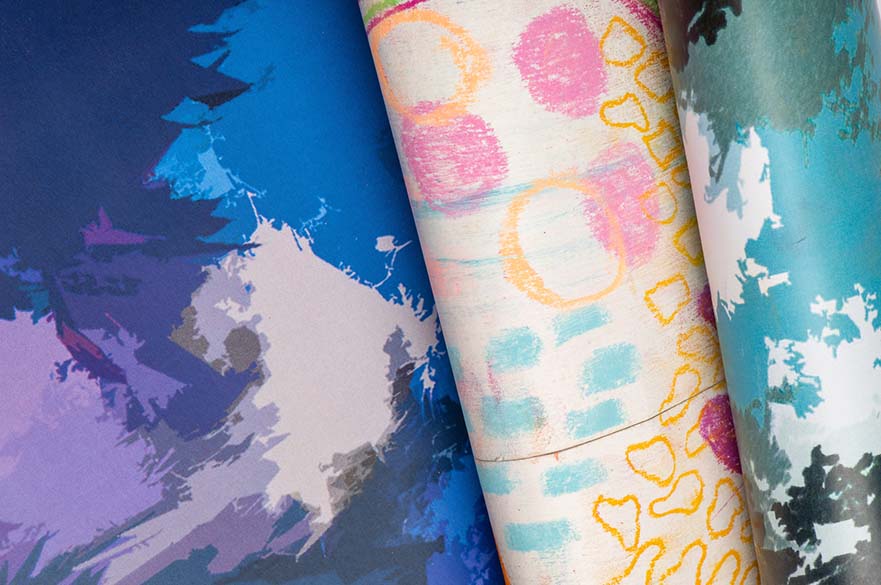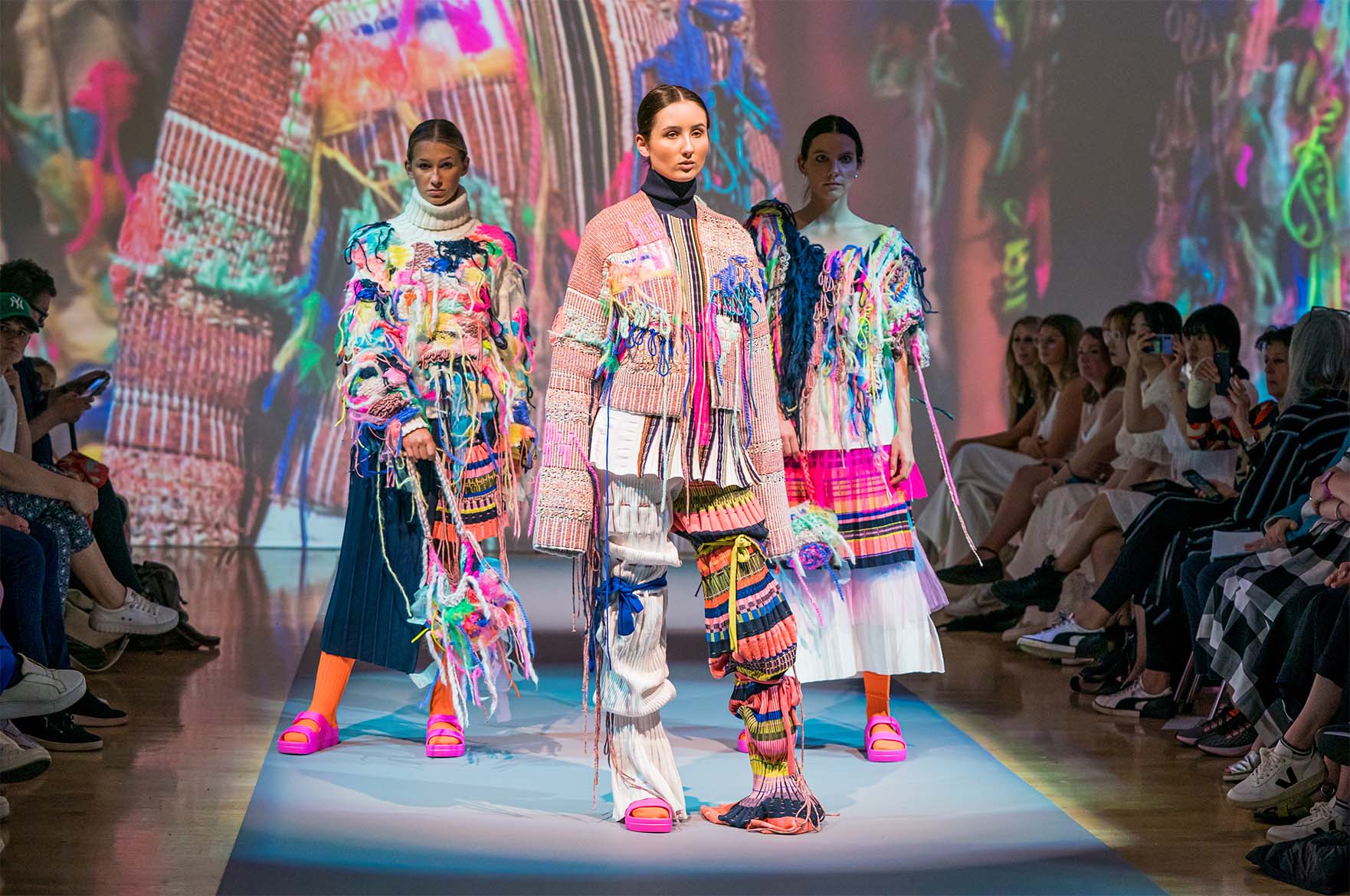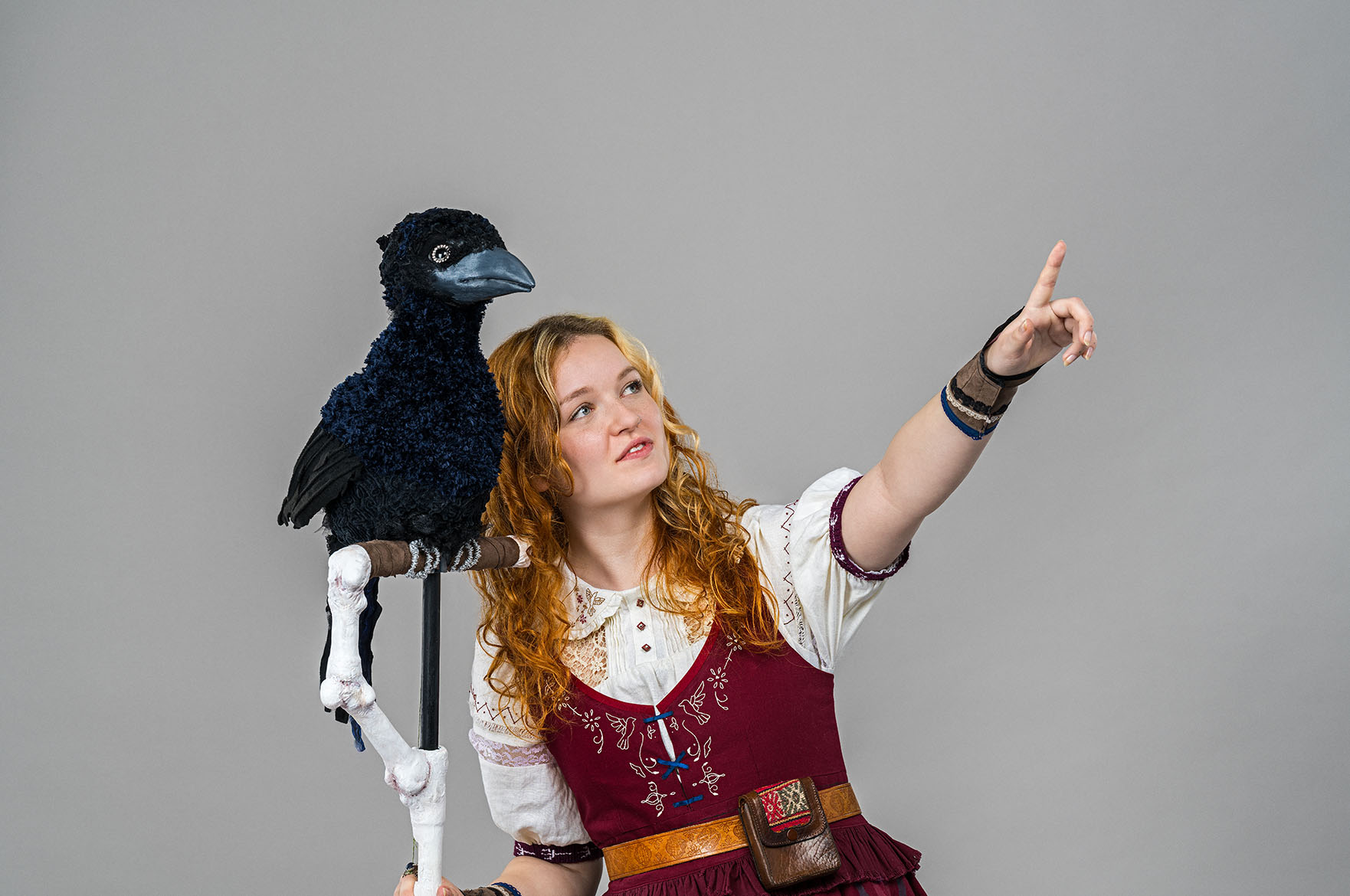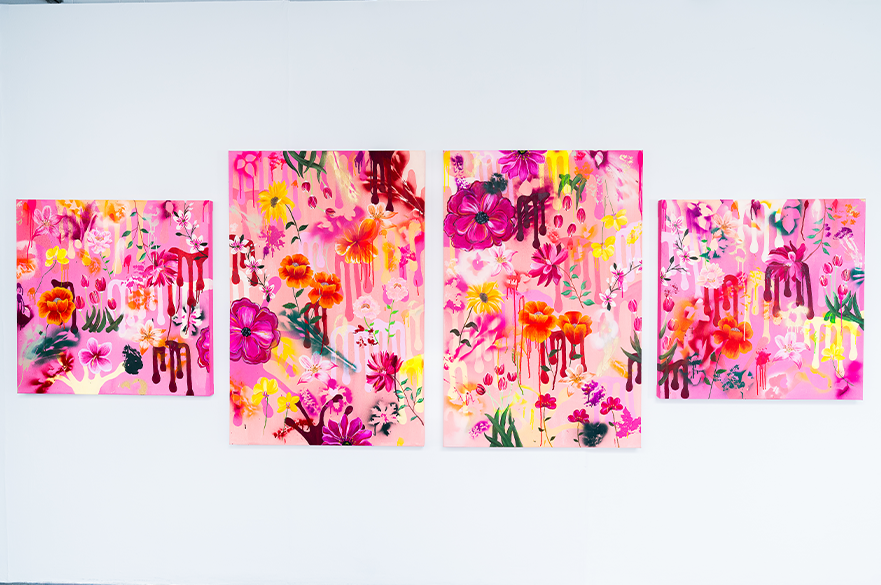This course is in Clearing
Offers from 80 tariff points
About this course
Textiles are all around us. They facilitate the practical, make our lives comfortable and provide a means for expression. Textile design goes far beyond fashion and clothing – from our furniture, vehicles and homeware to art and virtual reality, textile designers’ influence is everywhere, and their mediums are limitless.
This textile design degree is for the creative, the experimental and the environmentally conscious. It’s for designers and artists alike, giving you the flexibility to trial all types of media and master traditional crafts side by side with the latest digital technologies. Many of our students go on to become industry trailblazers, prestigious award-winners and respected designers; study BA Textile Design at NTU, and you could join them.
With 92 million tonnes of textiles waste produced every year and the apparel industry’s global emissions set to increase by 50% by 2030, sustainable textile design has never been more important. On this course, conscious creativity comes first. You’ll become an agent of change, advocating for responsible design and future-proofing the industry.
15
What you’ll study
BA Textile Design at NTU is distinct because it allows you to explore the breadth of the textiles industry in Year One, before specialising in your preferred areas from Year Two onwards with a vast choice of optional modules.
Textile design is an endlessly diverse field, and you’ll cover print, embroidery, knit, weave and unconventional materials. You’ll work on projects ranging from fashion and art to interiors and automotives; tackle live briefs set by our industry partners; and have the creative freedom to direct your work and refine your technical skills, guided by experienced professionals.
Sustainable practice is fully embedded into every aspect of our textiles degree, with strong emphasis on creating emotional durability, designing for circularity, and reducing consumption and waste.
Study highlights on this textiles degree include:
- Network with big textiles industry players like Sainsbury’s, Ashley Wilde and Burton as you complete live briefs for them.
- Attend workshops and masterclasses in a whole host of skills and crafts, from making and using natural dyes to ceramics, bio-materials, 3D printing & generative AI.
- Get inspired on trips across the UK and abroad, with opportunities to visit galleries and exhibitions in cities like Oxford, London and Paris.
- Make the most of industry-standard facilities across the School of Art and Design, with the same equipment and technologies used by major brands.
- Exhibit your work to potential employers and fellow designers across the UK at prominent graduate exhibitions and showcase events.
- Enjoy an Adobe Creative Cloud subscription, lots of workshop materials, out-of-hours access to our facilities and guidance from expert technicians, and much more included in your course fees.
- Expand your industry network with free classes led by external textile artists and practitioners, and the opportunity to exhibit your graduate collection at New Designers showcase.
Here’s a full breakdown of your textile design modules:
Curiosity: Creative Exploration and Research
(40 credit points, full year)
Working with students from fashion, textiles and knitwear, explore core design components such as concept, drawing, materials, colour and future thinking. Question how fundamental aspects of design practice can be used as both research tools and a means to develop your design philosophy or identity in a creative, playful and hands-on way. Begin to see the future as something you can shape, rather than something that just happens.
Curiosity: Creative Development and Application for Textile Design
(80 credit points, full year)
Develop your creative design ideas and apply fundamentals of textile design practice including, pattern, repeat and composition, through a series of workshop rotations in print, weave, knit, embroidery and multimedia. A pathways project at the end of the year will consolidate your strengths and choice of textile specialism for Year Two. There is the option to transfer to Fashion Knitwear Design and Knitted Textiles for those that love knit.
Directions: Industry and Context for Textile Design
(40 credit points, first half of the year)
Develop awareness of the practice of design within the international textile industry. Advance creative design and technical skills in your specialised area of print, weave, embroidery or multimedia. Deepen your research skills and knowledge of emerging cultural issues including responsible design practice, trends, markets and professional communication, and engage with industry through live projects, work experience and an optional overseas trip to an international trade fair.
Directions: Innovation and Transition for Textile Design
(40 credit points, second half of the year)
This module supports your transition to your final year, enhancing your ability to develop individual research proposals that reflect personal design interests and building on theory and practice. You will extend and test innovative approaches to your specialist textile area, working beyond discipline boundaries where appropriate.
Co Lab: Research, Exploration and Risk-taking
(20 credit points, second half of the year)
Through active participation with team-based problem solving, you will work together in mixed teams on a project where you will use your creative ideas to generate solutions to a challenge or brief. Your project will allow you to explore how creativity can make an impact in society, as you choose a theme of sustainability, social justice, enterprise and innovation or community. This collaborative learning experience will expose you to a range of new processes and approaches that will develop your creative thinking.
Optional module
You will also choose one 20-credit module from:
- Slow Making and Craftmanship
- 3D Materials and Exploration
- Trend Forecasting
- Buying, Merchandising and Product Fundamentals
- Creative Entrepreneurship
- Drawing & Exploring with Natural Materials
- Ecological Futures: A Creative Response
- Fashion Styling
Optional Placement Year (Sandwich)*
We have an option for all of our students to undertake a placement year (Sandwich) and allow you to decide whether this is right for you once you have completed years 1 and 2 of your course. This time spent working in industry provides our students with crucial work experience, which is highly prized and much sought after by employers upon graduation. If you are successful in securing a placement you will have the chance to gain an additional Certificate or Diploma in Professional Practice, dependent on duration.
The additional placement year incurs a fee. For international students considering the transfer to the 4-yr SW route it’s important to seek advice from the International Student Support team and the Home Office regarding any potential visa implications and costs. For UK students, advice should also be sought regarding SLC eligibility, if applicable.
* If you choose to take the sandwich route option, you will still need to apply for this course with the full-time UCAS code: W221
Resolutions: Culture and Context
(20 / 40 credit points, full year)
Develop an individual research concept established at the end of second year that advances your knowledge of contextual issues, cultural theories and debates. You will present this as a dissertation or in the alternative format of a visual product. Students choosing the 40-credit option will complete an extended body of research work for exhibition or publication.
Resolutions: Practice and Context for Textile Design
(100 / 80 credit points, full year)
Write your own design brief that enables you to produce an extensive body of work, relating to your career aspirations and reflecting responsible design practices. You will be encouraged to use theories explored in your individual research project to inform your final design collections. You will have opportunities to engage with live projects, competitions and professional bodies to broaden your portfolio and strategically enhance career directions. Students choosing the 80-credit option will produce a smaller design portfolio to reflect the balance of work suitable for alternative career directions.
We regularly review and update our course content based on student and employer feedback, ensuring that all of our courses remain current and relevant. This may result in changes to module content or module availability in future years.
Don’t just take our word for it, hear from our students themselves
Student Work
Video Gallery
How you're taught
How will I learn?
As a BA Textile Design student, you’ll be taught through a mix of:
- briefings and seminars, during which you’ll receive project briefs (set by both tutors and industry partners) and collaborate with your coursemates
- workshops, studio sessions and CAD training, for focusing on practical work and digital skills
- lectures covering key topics and contemporary issues in textiles
- textile demonstrations and masterclasses, where you can learn an extensive variety of technical skills like ceramics, laser cutting, natural dyeing, 3D printing, painting and more
- one-to-ones and small-group tutorials, for discussing ongoing projects with your tutors and coursemates
- Co Lab, a pioneering School-wide module which connects you with NTU students from other disciplines to work together on live briefs and community projects
- study visits to exhibitions, galleries, shows and events across the UK and abroad.
Your textiles degree will combine individual and group projects, giving you plenty of opportunities to bond with your coursemates and take full advantage of the diversity of ideas and specialities within your new community of textile designers.
You’ll also get to go on UK trips to destinations such as Yorkshire Sculpture Park, Pitt Rivers Museum in Oxford, and London for events like Decorex – the costs of which are covered by your course fees. There will also be an opportunity to go on a subsidised trip abroad, usually to Paris.
How you're assessed
Much of your assessed work will be in the form of portfolios, in which you’ll present your creative processes from start to finish and showcase your practical skills. There is also a very small amount of written work involved, in the form of a short essay and reflective passages.
The course culminates in the curation of your own graduate collection, which will align with your career aspirations. You’ll also complete a theoretical assignment in final year, for which you can choose to produce either a written dissertation or a visual product.
Careers and employability
Over our 180-year history of teaching textile design – a course whose heritage lies in Nottingham’s famous lace industry – hundreds of our graduates have gone on to shape the textiles community and industry worldwide. By studying at NTU, you can continue this legacy.
The diverse nature of this textiles degree lends itself to a broad range of career paths and industries, like fashion, interiors, automotive and trend prediction. You could become one of the designers, makers and artists behind the textiles that surround us every day; you could go into buying, styling, merchandising and product development; or you could explore textiles research, develop sustainable solutions, or educate others. As you progress through the course, you’ll get a taste of all these things and discover where your interests, strengths and ambitions lie.
With a guaranteed minimum of 240 hours of work-like experience under your belt and countless networking opportunities, you’ll graduate from NTU with the skills and confidence to make an impact wherever you go.
Our recent graduates have gone on to become:
- Print Designers at ASOS, Habitat, Ashley Wilde and 304 Clothing
- Embroidery Designers at Burberry and Hermione De Paula
- Woven Textile Designers at Sage Automotive Interiors and Edward Thomas Interiors
- Assistant and Trainee Buyers at Next, Dunelm and Boohoo
- Marketing Executive at Aston Martin
- Design Assistants at Emilia Wickstead and Holmes Interiors
- Materials Graduate at Gymshark
Every NTU student can access tailored support from our award-winning Employability team for three years after you graduate, as well as our comprehensive online career resources for life. You can also benefit from our Graduate Employment Promise, which guarantees you a paid internship if you’re not in skilled work 12 months after graduation.
Placements
Between Year Two and your final year, you’ll have the opportunity to complete a year-long placement to boost your employability and gain real work experience.
The live projects you’ll complete during your textiles degree will put you in direct contact with big industry names, and these new contacts often offer placements to stand-out students. These are sometimes paid, and usually offer free accommodation. One of our industry partners recently offered 10 expenses-paid placements to second years, while other students completed placements abroad in Amsterdam, Ghana and Copenhagen.
The UK Fashion and Textiles Association (UKFT) also offer placements and financial assistance to textile design students, thanks to NTU’s UKFT membership.
Showcase and competitions
As well as entering a wide range of competitions internally and externally, you will exhibit your work to members of the creative industries at NTU’s showcase events, as well as on our online showcase site, which has attracted over 500,000 visitors since its launch in 2020. Both are excellent ways to reach potential employers and future collaborators, and many textile design students secure opportunities and job roles as a direct result of these connections.
Campus and facilities
As a textile design student, you’ll be based in our contemporary Bonington building, which is home to its very own art gallery with an exciting calendar of exhibitions. You’ll also have access to a broad range of specialist, industry-standard facilities across the School of Art and Design. Just a handful of these include:
- Embroidery, knit and weave workshops with industrial and domestic machines, and several types of weaving looms.
- Print rooms with digital fabric printers, large flatbed printers for wallpaper printing, plus additional facilities for 3D printing.
- Computer-aided design (CAD) suites, fully equipped with high-spec computers and Adobe Creative Cloud, Wilcom Embroidery and Pointcarre Weave software ready to use.
- Natural dye and biomaterial labs for experimenting with natural and sustainable materials and methods.
- Photography suites with professional cameras and equipment.
- Resin, ceramics, casting, wood and further specialist workshops which you can choose to branch out into.
Find out more about our textile design facilities.
Our City Campus has everything you’ll need to keep occupied between lectures. As well as the Boots Library and its beautiful roof garden, there’s a 100-station gym; a whole host of cafés, bars and restaurants catering to every taste; our Students’ Union and popular Global Lounge; plenty of relaxed spaces to tackle your assignments or catch up with friends; and much, much more!
If that’s not enough, just take a few steps off campus, and you’ll find yourself in the beating heart of Nottingham: one of Britain’s top 10 student cities, and a hub of creative activity. Get inspired by famed vintage fashion outlets such as Cow and Braderie, quirky independent businesses, and vibrant cultural hotspots like Nottingham Contemporary and Broadway Cinema.
Entry requirements
This course is in Clearing
Looking for a place in Clearing? We are accepting application and would love to hear from you!
UK students
This course is in Clearing
Looking for a place in Clearing? We are accepting applications and would love to hear from you!
Clearing requirements
From 80 UCAS tariff points from up to 4 qualifications.
To discuss our entry requirements and see what we can offer you, call us now on +44 (0)115 848 6000. Alternatively, if you already have your qualifications, apply online via our Clearing Application form.
Preparing for results day? Beat the queue and sign up for NTU Priority for up-to-date information about all things Clearing. You’ll get an offer ahead of Clearing, subject to you achieving the required grades on results day.
Other requirements
To find out what qualifications have tariff points, please use our tariff calculator.
Additional requirements for UK students
There are no additional requirements for this course.
Contextual offers
If you don’t quite meet our entry requirements, we might be able to make you a lower offer based on a range of factors, including your background (such as where you live and the school or college you attended), your experiences and your individual circumstances (you may have been in care, for example). This is called a contextual offer, and we get data from UCAS to help make these decisions. We do this because we believe everyone with the potential to succeed at NTU should have the opportunity to do so, no matter what barriers you may face.
Meeting our entry requirements
Hundreds of qualifications in the UK have UCAS Tariff points attached to specific grades, including A-levels, BTECs, T Levels and many more. You can use your grades and points from up to four different qualifications to meet our criteria. Enter your predicted or achieved grades into our Tariff calculator to find out how many points your qualifications are worth.
Other qualifications and experience
NTU welcomes applications from students with non-standard qualifications and learning backgrounds, either for year one entry or for advanced standing beyond the start of a course into year 2 or beyond.
We consider study and/or credit achieved from a similar course at another institution (otherwise known as credit transfer), vocational and professional qualifications, and broader work or life experience.
Our Recognition of Prior Learning and Credit Transfer Policy outlines the process and options available for this route. If you wish to apply via Recognition of Prior Learning, please contact the central Admissions and Enquiries Team who will be able to support you through the process.
Getting in touch
If you need more help or information, get in touch through our enquiry form.
International students
This course is in Clearing
Looking for a place in Clearing? We are accepting applications and would love to hear from you!
Clearing requirements
From 80 UCAS tariff points from up to 4 qualifications.
To discuss our entry requirements and see what we can offer you, call us now on +44 (0)115 848 6000. Alternatively, if you already have your qualifications, apply online via our Clearing Application form.
Preparing for results day? Beat the queue and sign up for NTU Priority for up-to-date information about all things Clearing. You’ll get an offer ahead of Clearing, subject to you achieving the required grades on results day.
We accept equivalent qualifications from all over the world. Please check your international entry requirements by country.
Other requirements
English language requirements: See our English language requirements page for requirements for your subject and information on alternative tests and Pre-sessional English.
Additional requirements for international students
If you need help achieving the academic entry requirements, we offer a Foundation preparation course for this degree. The course is offered through our partner Nottingham Trent International College (NTIC) based on our City campus.
English language requirements
View our English language requirements for all courses, including alternative English language tests and country qualifications accepted by the University.
If you need help achieving the language requirements, we offer a Pre-Sessional English for Academic Purposes course on our City campus which is an intensive preparation course for academic study at NTU.
Other qualifications and experience
If you have the right level of qualifications, you may be able to start your Bachelors degree at NTU in year 2 or year 3. This is called ‘advanced standing’ entry and is decided on a case-by case basis after our assessment of your qualifications and experience.
You can view our Recognition of Prior Learning and Credit Transfer Policy which outlines the process and options available, such as recognising experiential learning and credit transfer.
Sign up for emails
Sign up to receive regular emails from the International Office. You'll hear about our news, scholarships and any upcoming events in your country with our expert regional teams.
Getting in touch
If you need advice about studying at NTU as an international student or how to apply, our international webpages are a great place to start. If you have any questions about your study options, your international qualifications, experience, grades or other results, please get in touch through our enquiry form. Our international teams are highly experienced in answering queries from students all over the world.
Policies
We strive to make our admissions procedures as fair and clear as possible. To find out more about how we make offers, visit our admissions policies page.


